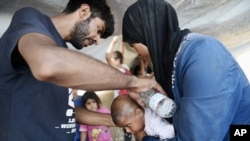Amid chaotic scenes at border crossings and train stations throughout Europe, Macedonia, Serbia, Hungary and Austria have signed an agreement to adopt a common approach in dealing with the migrant and refugee crisis in their countries, and to work together to tackle the growing humanitarian challenges.
The memorandum of understanding was signed Friday in the city of Ohrid, Macedonia by the interior ministers of Macedonia, Serbia and Austria, and the deputy interior minister of Hungary.
“We underlined here that global migration issues cannot be addressed by fragmented solutions," said Macedonian Interior Minister Mitko Cavkov. "The document we signed represents a platform for our joint activities that will be specified at the upcoming meeting of EU interior ministers.”
Austrian Interior Minister Johanna Mikl-Leitner added that a common approach to the refugee crisis will yield a comprehensive solution that will deal not only with the crisis on the borders of the four countries, but also with the issue of adequate funding and humanitarian aid, as well as the need to crack down on human traffickers and organized crime that have been exploiting the crisis.
Meanwhile, hundreds of refugees in Hungary remain locked in a stalemate with authorities after being denied permission to travel onward to Germany.
Hungary shut its main border crossing with Serbia after some 300 migrants escaped from a camp in the town of Roszke, prompting a police search operation.
Hungary's deputy interior minister, Kristine Berta, said “the problem with migrants is not a problem for just a few countries, but all over Europe and other countries.”
Serbian Interior Minister Nebojsa Stefanovic agreed, noting that since the start of the year, more than 120,000 people have expressed their intention to seek asylum in Serbia. Most of them, he said, wanted to move on to western Europe.
“Serbia will be a good host to all refugees and will actively work to find better ways to help them, but others need to share the burden," Stefanovic said. "Europe has to demonstrate its values.”
Earlier Friday, the United Nations called on EU countries to accept up to 200,000 refugees as part of a "common strategy" to replace their "piecemeal" approach to the migrant and refugee crisis.
The head of the U.N. refugee agency, Antonio Guterres, said the refugee crisis was “a defining moment for the European Union” and called on EU member states to “mobilize full force around this crisis.”




